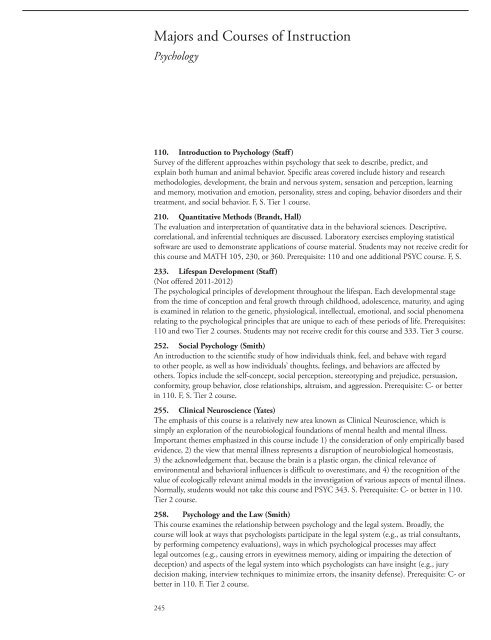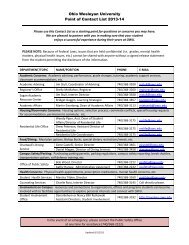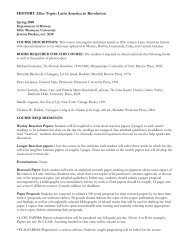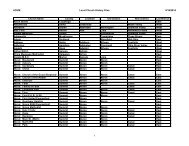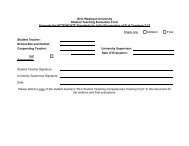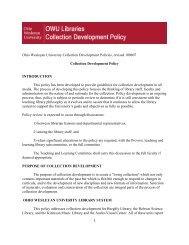- Page 3 and 4:
2011/2012 CatalogOhio Wesleyan Univ
- Page 7 and 8:
The UniversityIntroductionIntroduct
- Page 9 and 10:
The UniversityIntroductionStatement
- Page 11 and 12:
The UniversityIntellectual Freedom
- Page 13:
The UniversityTraditionsMonnett Cam
- Page 19 and 20:
Academic RegulationsAnd ProceduresR
- Page 21 and 22:
Academic RegulationsAnd ProceduresR
- Page 23 and 24:
Academic RegulationsAnd ProceduresA
- Page 25 and 26:
Academic RegulationsAnd ProceduresA
- Page 27 and 28:
Academic RegulationsAnd ProceduresA
- Page 29 and 30:
Academic RegulationsAnd ProceduresF
- Page 31:
Academic RegulationsAnd ProceduresT
- Page 34 and 35:
Academic Honors and PrizesHonors Co
- Page 36 and 37:
Academic Honors and PrizesPrizes an
- Page 38 and 39:
Academic Honors and PrizesPrizes an
- Page 40 and 41:
Academic Honors and PrizesPrizes an
- Page 42 and 43:
Academic Honors and PrizesHonorary
- Page 44 and 45:
Degrees and Special ProgramsRequire
- Page 46 and 47:
Degrees and Special ProgramsThe Bac
- Page 48 and 49:
Degrees and Special ProgramsThe Bac
- Page 50 and 51:
Degrees and Special ProgramsOther P
- Page 52 and 53:
Degrees and Special ProgramsOff-Cam
- Page 54 and 55:
Degrees and Special ProgramsInterna
- Page 56 and 57:
Degrees and Special ProgramsApprent
- Page 59 and 60:
Majors and Courses of InstructionKe
- Page 61 and 62:
Majors and Courses of InstructionAn
- Page 63:
Majors and Courses of InstructionAn
- Page 66 and 67:
Majors and Courses of InstructionBi
- Page 68 and 69:
Majors and Courses of InstructionBi
- Page 70 and 71:
Majors and Courses of InstructionBi
- Page 72 and 73:
Majors and Courses of InstructionBi
- Page 74 and 75:
Majors and Courses of InstructionBi
- Page 76 and 77:
Majors and Courses of InstructionBi
- Page 78 and 79:
Majors and Courses of InstructionBl
- Page 80 and 81:
Majors and Courses of InstructionBl
- Page 83 and 84:
Majors and Courses of InstructionCh
- Page 85 and 86:
Majors and Courses of InstructionCh
- Page 87 and 88:
Majors and Courses of InstructionCo
- Page 89 and 90:
Majors and Courses of InstructionPr
- Page 91:
Major Courses of InstructionEast As
- Page 94 and 95:
Majors and Courses of InstructionEc
- Page 96 and 97:
Majors and Courses of InstructionEc
- Page 98 and 99:
Majors and Courses of InstructionEc
- Page 100 and 101:
Majors and Courses of InstructionEc
- Page 102 and 103:
Majors and Courses of InstructionEc
- Page 104 and 105:
Majors and Courses of InstructionEc
- Page 106 and 107:
Majors and Courses of InstructionAc
- Page 108 and 109:
Majors and Courses of InstructionEd
- Page 110 and 111:
Majors and Courses of InstructionEd
- Page 112 and 113:
Majors and Courses of InstructionEd
- Page 114 and 115:
Majors and Courses of InstructionEd
- Page 116 and 117:
Majors and Courses of InstructionEd
- Page 118 and 119:
Majors and Courses of InstructionEn
- Page 120 and 121:
Majors and Courses of InstructionEn
- Page 122 and 123:
Majors and Courses of InstructionEn
- Page 124 and 125:
Majors and Courses of InstructionEn
- Page 126 and 127:
Majors and Courses of InstructionEn
- Page 128 and 129:
Majors and Courses of InstructionEn
- Page 131 and 132:
Majors and Courses of InstructionFi
- Page 133 and 134:
Majors and Courses of InstructionFi
- Page 135 and 136:
Majors and Courses of InstructionFi
- Page 137 and 138:
Majors and Courses of InstructionFi
- Page 139 and 140:
Major Courses of InstructionFrenchG
- Page 141 and 142:
Majors and Courses of InstructionGe
- Page 143 and 144:
Majors and Courses of InstructionGe
- Page 145 and 146:
Majors and Courses of InstructionGe
- Page 147 and 148:
Majors and Courses of InstructionGe
- Page 149 and 150:
Majors and Courses of InstructionGe
- Page 151 and 152:
Major Courses of InstructionHistory
- Page 153 and 154:
Major Courses of InstructionHistory
- Page 155 and 156:
Major Courses of InstructionHistory
- Page 157 and 158:
Major Courses of InstructionHistory
- Page 159:
Major Courses of InstructionHistory
- Page 162 and 163:
Majors and Courses of InstructionHu
- Page 164 and 165:
Majors and Courses of InstructionHu
- Page 166 and 167:
Majors and Courses of InstructionHu
- Page 168 and 169:
Majors and Courses of InstructionHu
- Page 170 and 171:
Majors and Courses of InstructionHu
- Page 172 and 173:
Major Courses of InstructionInterna
- Page 175 and 176:
Majors and Courses of InstructionJo
- Page 177:
Majors and Courses of InstructionJo
- Page 180 and 181:
Majors and Courses of InstructionLa
- Page 182 and 183:
Majors and Courses of InstructionMa
- Page 184 and 185:
Majors and Courses of InstructionMa
- Page 186 and 187:
Majors and Courses of InstructionMa
- Page 188 and 189:
Majors and Courses of InstructionMa
- Page 190 and 191:
Majors and Courses of InstructionMo
- Page 192 and 193:
Majors and Courses of InstructionMo
- Page 194 and 195:
Majors and Courses of InstructionMo
- Page 196 and 197:
Majors and Courses of InstructionMo
- Page 198 and 199:
Majors and Courses of InstructionMo
- Page 200 and 201: Majors and Courses of InstructionMo
- Page 202 and 203: Majors and Courses of InstructionMo
- Page 205 and 206: Majors and Courses of InstructionMu
- Page 207 and 208: Majors and Courses of InstructionMu
- Page 209 and 210: Majors and Courses of InstructionMu
- Page 211 and 212: Majors and Courses of InstructionMu
- Page 213 and 214: Majors and Courses of InstructionMu
- Page 215: Majors and Courses of InstructionNe
- Page 218 and 219: Majors and Courses of InstructionPh
- Page 220 and 221: Majors and Courses of InstructionPh
- Page 222 and 223: Majors and Courses of InstructionHe
- Page 224 and 225: Majors and Courses of InstructionHe
- Page 226 and 227: Majors and Courses of InstructionHe
- Page 228 and 229: Majors and Courses of InstructionHe
- Page 231 and 232: Majors and Courses of InstructionPh
- Page 233 and 234: Majors and Courses of InstructionPh
- Page 235 and 236: Majors and Courses of InstructionPh
- Page 237: Majors and Courses of InstructionPl
- Page 240 and 241: Majors and Courses of InstructionPo
- Page 242 and 243: Majors and Courses of InstructionPo
- Page 244 and 245: Majors and Courses of InstructionPo
- Page 246 and 247: Majors and Courses of InstructionPr
- Page 248 and 249: Majors and Courses of InstructionPr
- Page 252 and 253: Majors and Courses of InstructionPs
- Page 254 and 255: Majors and Courses of InstructionPs
- Page 256 and 257: Majors and Courses of InstructionPs
- Page 258 and 259: Majors and Courses of InstructionRe
- Page 260 and 261: Majors and Courses of InstructionRe
- Page 262 and 263: Majors and Courses of InstructionRe
- Page 265 and 266: Majors and Courses of InstructionSo
- Page 267 and 268: Majors and Courses of InstructionSo
- Page 269 and 270: Majors and Courses of InstructionSo
- Page 271 and 272: Majors and Courses of InstructionSp
- Page 273 and 274: Majors and Courses of InstructionTh
- Page 275 and 276: Majors and Courses of InstructionTh
- Page 277 and 278: Majors and Courses of InstructionTh
- Page 279 and 280: Majors and Courses of InstructionUr
- Page 281 and 282: Majors and Courses of InstructionWo
- Page 283 and 284: Majors and Courses of InstructionWo
- Page 285: Student Life and Non-Academic Regul
- Page 288 and 289: Expenses and Financial AidFinancial
- Page 290 and 291: Expenses and Financial AidFeesProfi
- Page 292 and 293: Expenses and Financial AidFeesPayme
- Page 294 and 295: Expenses and Financial AidWithdrawa
- Page 296 and 297: FacilitiesUniversity HousingUnivers
- Page 298 and 299: FacilitiesInstructional and Adminis
- Page 301 and 302:
University OfficesUniversity Office
- Page 303 and 304:
The Corporation (Board of Trustees)
- Page 305 and 306:
University PersonnelOffice of Enrol
- Page 307 and 308:
University PersonnelOffice of the P
- Page 309 and 310:
University PersonnelOffice of Unive
- Page 311 and 312:
University PersonnelFaculty and Sta
- Page 313 and 314:
University PersonnelDepartment Chai
- Page 315 and 316:
University PersonnelFaculty of Inst
- Page 317 and 318:
University PersonnelFaculty of Inst
- Page 319 and 320:
University PersonnelFaculty of Inst
- Page 321:
University PersonnelFaculty of Inst
- Page 324 and 325:
IndexEearth science 36, 83, 101, 13
- Page 326 and 327:
IndexQquantitative reasoning requir
- Page 328:
Catalog 2011/201261 South Sandusky


